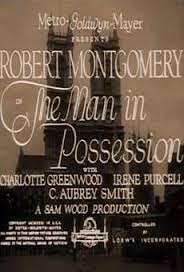
THE MAN IN POSSESSION
US, 1931, 84 minutes, Black and white.
Robert Montgomery, Irene Purcell, Charlotte Greenwood, C.Aubrey Smith, Beryl Mercer, Reginald Owen, Alan Mowbray, Forrester Harvey.
Directed by Sam Wood (uncredited).
The Man in Possession is based on a play by H.M. Harwood, which appeared on Broadway in 1930. The film was remade as Personal Property in 1937, a star vehicle for Jean Harlow and Robert Taylor. This original was pre-Code, more innuendo and suggestiveness then was permitted by 1937.
The description given for the plot of Personal Property applies in most detail to this film, even to the central names, to the ne’er-do-well brother, Raymond, played by Robert Montgomery who was a main star at MGM at this time, appearing with its notable leading ladies. Irene Purcell is less known. The maid and cook is played by the lanky Charlotte Greenwood, always a good comedian. The parents are played by C.Aubrey Smith and Beryl Mercer, very British in their manner. The older brother is played by Reginald Owen who took the same role in the later film. Forrester Harvey is the bailiff, a role he also repeated in the later film.
The play is a solid basis for the film, a great deal of dialogue, humour and wit – and with innuendo – and the film consists of various set scenes.
Both films are entertaining in their way – illustrative of the types of comedies of the 1930s which eventually recalled screwball comedies, and marking differences in pre-Code and post-Code treatment of the same themes.
PERSONAL PROPERTY
US, 1937, 84 minutes, Black-and-white.
Jean Harlow, Robert Taylor, Reginald Owen, Una O' Connor, Henrietta Crossman, E.E.Clive, Forrester Harvey.
Directed by W.S.Van Dyke.
Personal Property is based on a play, produced on Broadway in 1930, The Man in Possession, by H. M. Harwood. It was filmed in 1931 with Robert Montgomery and Irene Purcell in the central roles. (Reginald Owen, who plays the older brother here, played that role in the earlier film as did Forrester Harvey as the bailiff.)
The film works as a play, a great deal of dialogue, much of it witty and humorous, with set scenes. It is a star vehicle for Jean Harlow, her second last film, her dying at age 26 after a brief but significant career. She is a bit lower key in this film than in her previous films. Her leading man is Robert Taylor, emerging as a suave hero at this time. The direction is by W.S. Van Dyke, a prolific director at this time and into the mid 40s with a wide range of films, including many of the Nelson Eddy- Jeanette Mac Donald musicals.
Robert Taylor plays Raymond who has just come out of jail, a touch of the ne’er-do-well, the love of his mother, but frowned on by his father and older brother who are in the ladies underwear business but are in need of finance, with the older brother intending to marry an alleged wealthy widow, played by Jean Harlow.
In fact, she is a beauty queen from the United States and has no money either. When his family want to pay off Raymond and get him to go anywhere else in the world, he encounters Jean Harlow, Crystal, and follows her around, embarrassing her at a restaurant, at the opera, and then having a brainwave when he meets a bailiff at her door and takes on the contract, enabling him to be in the house legally, to stay overnight until she pays up.
She is exasperated, wants to get rid of him, pretends that her husband is alive and gets Raymond to stay in the old butler’s room. There is a lot of smart repartee. And Una O’ Connor, is there as the cook and maid.
The main point of the film is that the fiance and his parents are to come to dinner, Raymond not realising who her fiance is. He offers to act as the butler; they have some joking scenes of practice on introducing tests; he then realises what is happening – and is not above playing all kinds of tricks on his increasingly angry brother. There is a social woman, endlessly chattering, with her gold-digging daughter. There is another guest with magnifying glasses because he cannot find his ordinary pair. And, extraordinary, there is a toffy British musician whose talk is la-de-dah and incomprehensible.
The marriage is to go ahead, Raymond tells his father and brother the truth and they get out, Crystal comes downstairs to be married – and there is Raymond.